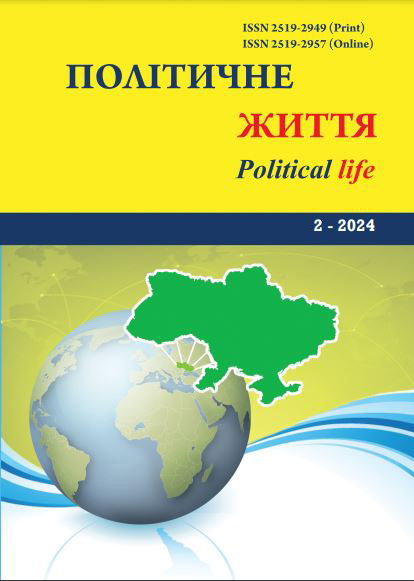Global experience of implementation and use of digital technologies in the election process
DOI:
https://doi.org/10.31558/2519-2949.2024.2.16Keywords:
elections, electronic voting (e-voting), digital technologies, blockchain technology, information securityAbstract
This article analyzes global experiences and compares various practices of implementing digital technologies in elections across countries with different regime characteristics. The study identifies the advantages, drawbacks, and potential risks associated with their adoption. Key benefits highlighted by the researcher include increased accessibility and convenience of voting, reduced election costs, and enhanced transparency and accuracy in vote counting. However, the author emphasizes significant risks such as cyberattacks, threats to confidentiality, and potential manipulation of results. Additionally, the article introduces a novel attempt to categorize countries based on their experiences with digital technology adoption. The author provides examples of both successful and unsuccessful experiences and underscores ongoing experiments in political participation digitalization by various countries. Comparing specific examples and different models of e-voting provides grounds for asserting the prospects for further research into the impact of digital technologies on voter turnout and citizen motivation for participating in governance. Special attention in the article is devoted to prospects for adapting global experiences to the Ukrainian context, particularly amidst armed conflict and post-war reconstruction. The analysis of global experiences in electoral digitalization and its effectiveness evaluation makes this article a significant contribution to the study of global democratic processes and their modernization. The article illuminates key aspects such as national e-voting models, legislative frameworks for electronic voting, technical capabilities, election security measures, and public trust in the electoral process. In conclusion, despite substantial technological advancements, demographic changes, internet accessibility, etc., the development, implementation, and especially the acceptance of electronic voting systems remain challenging issues for societal progress.
References
Бордііловська О. Результати виборів в Індії. https://niss.gov.ua. URL: https://niss.gov.ua/sites/default/files/2024-06/az_vibori-v-indii-2024_06062024.pdf. (дата звернення: 10.06.2024).
Пуртова А. Досвід електронного голосування у Болгарії – плюси та мінуси, які варто врахувати Україні. LB.ua. URL: https://lb.ua/blog/anna_purtova/490018_dosvid_elektronnogo_golosuvannya.html (дата звернення: 27.05.2024).
Alebiosu E. Smart Card Reader and the 2015 General Elections in Nigeria. Journal of African elections. 2016. Vol. 15, no. 2. P. 69–89. URL: https://doi.org/10.20940/jae/2016/v15i2a4 (дата звернення: 19.06.2024).
Alvarez R. M., Hall T. E., Trechsel A. H. Internet Voting in Comparative Perspective: The Case of Estonia. PS: Political Science & Politics. 2009. Vol. 42, no. 03. P. 497–505. URL: https://doi.org/10.1017/s1049096509090787 (дата звернення:19.06.2024).
Belga D. Elektronisch stemmen is 100 procent beveiligd. https://www.metrotime.be/. URL: https://www.metrotime.be/nl/nieuws/elektronisch-stemmen-100-procent-beveiligd (дата звернення: 29.05.2024).
Election Security. NIST. URL: https://www.nist.gov/itl/voting/research-and-projects/election-security (дата звернення: 31.05.2024).
Goldsmith B., Ruthrauff H. https://www.Implementing and Overseeing Electronic Voting and Counting Technologies. https://www.ndi.org. URL: https://www.ndi.org/sites/default/files/Implementing_and_Overseeing_ Electronic_Voting_and_Counting_Technologies.pdf (дата звернення: 15.05.2024).
Help America Vote Act of 2002 (HAVA). URL: https://www.eac.gov/sites/default/files/eac_assets/1/ 6/HAVA41.PDF.
Is Brazil’s Electronic Voting System Safe from Fraud and Manipulation?. Wilson Center. URL: https://www.wilsoncenter.org/event/brazils-electronic-voting-system-safe-fraud-and-manipulation (дата звернення:19.06.2024).
Nist-and-help-america-vote-act-2002-hava. https://www.nist.gov. URL: https://www.nist.gov/itl/voting/nist-and-help-america-vote-act-2002-hava. (дата звернення: 30.05.2024).
NSW Electoral Commission commits to explore technology assisted voting options to replace iVote – NSW Electoral Commission. Home – NSW Electoral Commission. URL: https://elections.nsw.gov.au/about-us/ media-centre/news-and-media-releases/nswec-commits-to-explore-tav-options (дата звернення: 19.05.2024).
Turnbull-Dugarte S. J., Devine D. Support for digitising the ballot box: A systematic review of i-voting pilots and a conjoint experiment. Electoral Studies. 2023. Vol. 86. P. 102679. URL: https://doi.org/10.1016/j.electstud.2023.102679 (дата звернення: 19.05.2024).
Verwendung von Wahlcomputern bei der Bundestagswahl 2005 verfassungswidrig : of 03.03.2009. URL: https://www.bundesverfassungsgericht.de/SharedDocs/Pressemitteilungen/DE/2009/bvg09-019.html (дата звернення: 16.03.2024).
Voter Registration. Élections Canada en ligne – Elections Canada On-line. URL: https://elections.ca/content.aspx?section=vot&dir=reg&document=index&lang=e (дата звернення: 07.05.2024).
Yang C. Singapore GE2020: Automatic recount if difference in votes between candidates is 2% or less. The Straits Times. URL: https://www.straitstimes.com/politics/singapore-ge2020-automatic-recount-if-difference-in-votes-between-candidates-is-2-or-less (дата звернення: 22.05.2024).

